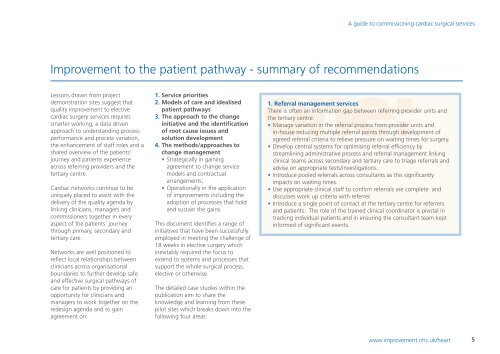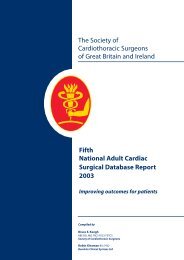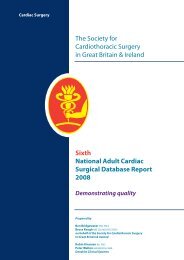A guide to commissioning cardiac surgical services - NHS ...
A guide to commissioning cardiac surgical services - NHS ...
A guide to commissioning cardiac surgical services - NHS ...
Create successful ePaper yourself
Turn your PDF publications into a flip-book with our unique Google optimized e-Paper software.
A <strong>guide</strong> <strong>to</strong> <strong>commissioning</strong> <strong>cardiac</strong> <strong>surgical</strong> <strong>services</strong><br />
Improvement <strong>to</strong> the patient pathway - summary of recommendations<br />
Lessons drawn from project<br />
demonstration sites suggest that<br />
quality improvement <strong>to</strong> elective<br />
<strong>cardiac</strong> surgery <strong>services</strong> requires<br />
smarter working, a data driven<br />
approach <strong>to</strong> understanding process<br />
performance and process variation,<br />
the enhancement of staff roles and a<br />
shared overview of the patients’<br />
journey and patients experience<br />
across referring providers and the<br />
tertiary centre.<br />
Cardiac networks continue <strong>to</strong> be<br />
uniquely placed <strong>to</strong> assist with the<br />
delivery of the quality agenda by<br />
linking clinicians, managers and<br />
commissioners <strong>to</strong>gether in every<br />
aspect of the patients’ journey<br />
through primary, secondary and<br />
tertiary care.<br />
Networks are well positioned <strong>to</strong><br />
reflect local relationships between<br />
clinicians across organisational<br />
boundaries <strong>to</strong> further develop safe<br />
and effective <strong>surgical</strong> pathways of<br />
care for patients by providing an<br />
opportunity for clinicians and<br />
managers <strong>to</strong> work <strong>to</strong>gether on the<br />
redesign agenda and <strong>to</strong> gain<br />
agreement on:<br />
1. Service priorities<br />
2. Models of care and idealised<br />
patient pathways<br />
3. The approach <strong>to</strong> the change<br />
initiative and the identification<br />
of root cause issues and<br />
solution development<br />
4. The methods/approaches <strong>to</strong><br />
change management<br />
• Strategically in gaining<br />
agreement <strong>to</strong> change service<br />
models and contractual<br />
arrangements;<br />
• Operationally in the application<br />
of improvements including the<br />
adoption of processes that hold<br />
and sustain the gains.<br />
This document identifies a range of<br />
initiatives that have been successfully<br />
employed in meeting the challenge of<br />
18 weeks in elective surgery which<br />
inevitably required the focus <strong>to</strong><br />
extend <strong>to</strong> systems and processes that<br />
support the whole <strong>surgical</strong> process,<br />
elective or otherwise.<br />
The detailed case studies within the<br />
publication aim <strong>to</strong> share the<br />
knowledge and learning from these<br />
pilot sites which breaks down in<strong>to</strong> the<br />
following four areas:<br />
one:<br />
1. Referral management <strong>services</strong><br />
There is often an information gap between referring provider units and<br />
the tertiary centre:<br />
• Manage variation in the referral process from provider units and<br />
in-house reducing multiple referral points through development of<br />
agreed referral criteria <strong>to</strong> relieve pressure on waiting times for surgery.<br />
• Develop central systems for optimising referral efficiency by<br />
streamlining administrative process and referral management linking<br />
clinical teams across secondary and tertiary care <strong>to</strong> triage referrals and<br />
advise on appropriate tests/investigations.<br />
• Introduce pooled referrals across consultants as this significantly<br />
impacts on waiting times.<br />
• Use appropriate clinical staff <strong>to</strong> confirm referrals are complete and<br />
discusses work up criteria with referrer.<br />
• Introduce a single point of contact at the tertiary centre for referrers<br />
and patients. The role of the trained clinical coordina<strong>to</strong>r is pivotal in<br />
tracking individual patients and in ensuring the consultant team kept<br />
informed of significant events.<br />
www.improvement.nhs.uk/heart<br />
5
















